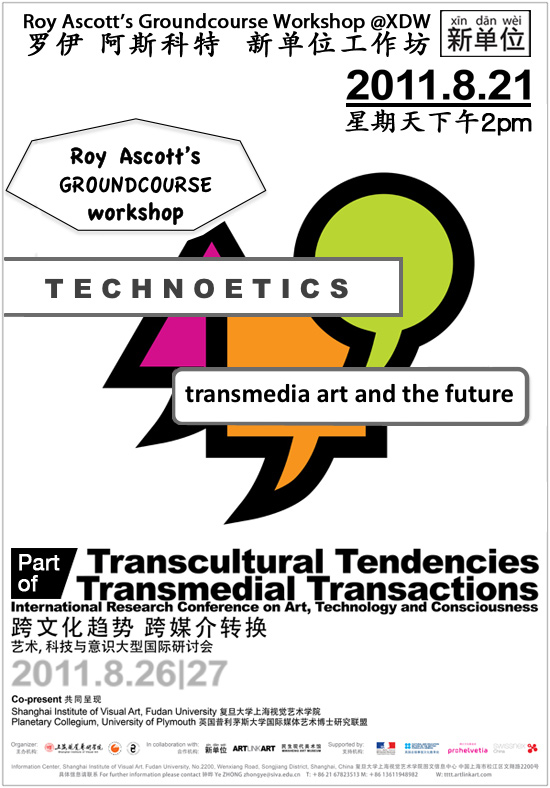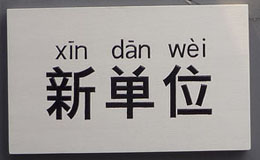
[lang_en]
Technoetics – transmedia art and the future
Roy Ascott’s GROUNDCOURSE Workshop @Xindanwei
Time: 2pm-4pm, Sunday, August 21st.
Language: English
Venue: Xindanwei, 50 Yongjia Rd.
Cost: 30 rmb/person, with fresh coffee and tea provided
Organizer: TTTT Media Arts Conference Shanghai, The Planetary Collegium, University of Plymouth, Fudan University, Xindanwei
About The Event
A one-day update of the Groundcourse programme, as designed by Roy Ascott at the Ealing School of Art in London, and Ipswich School of Art, during the 1960s.
The Groundcourse values a syncretic approach to creativity, combining analogue and digital structures and systems, and communication and construction in both physical space and cyberspace.
The Project is about:
personal identity
the multiple self,
flexible mind
group participation
inter-dependence
celebration of difference
creative community
art as organism,
social cybernetics
The Method foregrounds:
process and system
behaviour
questioning pre-conceptions
challenging artistic conventions
The Attitude involves adaptation to:
behavioural constraints
environmental changes
limitation of tools and materials
deadlines
communicative barriers
The Production involves the creation of :
five-person groups
mind-maps (personal model of the human being )
calibrators (indicating required adaptations to changing conditions)
ordered entities (material and conceptual)
The Outcomes augment:
self-realization
inter-personal sensibility
cultural awareness
innovative thought
adaptive skills
social connectivity
ONE-DAY PROGRAMME
Introduction: Aims and Objectives of the workshop.
Lecture: Illustrated Introduction to the Groundcourse historically and its contemporary relevance.
Group Discussion.
Lecture: Approaches to modeling mind and reality; mapping behaviour and personality; identifying means and methods in emergent art practice.
Group Discussion.
Practice: design of mind-maps and personal calibrators
Formation: pentagonal groups (randomly selected).
Practice: playing out limitations of behaviour within the group in realization of stated objective.
Practice: consolidation and presentation of the resultant ordered entities.
Group Discussion: limitations, possibilities, and future applications.
Summation. Workshop staff.
About Roy Ascott
Roy Ascott studied Fine Art at King’s College, University of Durham (now Newcastle University) under Victor Pasmore and Richard Hamilton, and Art History under Lawrence Gowing and Quentin Bell from 1955-59. He established the radical Groundcourse at Ealing Art College, which he subsequently established at Ipswich Civic College, in Suffolk. Notable alumni of the Groundcourse include Brian Eno, Pete Townshend,Stephen Willats,[3] and Michael English.
He taught in London (Ealing), and was a visiting lecturer at other London art schools throughout the 1960s. Then briefly was President of Ontario College of Art and Design, Toronto, before moving to California as Vice-President and Dean of San Francisco Art Institute, during the 1970s. He was Professor for Communications Theory at the University of Applied Arts Viennaduring the 1980s, and Professor of Technoetic Arts at the University of Wales, Newport in the 1990s.
He has advised new media arts organizations in Brazil, Japan, Korea, Europe and North America, as well as UNESCO, and since 2000 has been a Visiting Professor in Design/Media Artat the UCLA School of the Arts. He is the founding editor of Technoetic Arts, journal of speculative research, and an Honorary Editor of Leonardo Journal. Ascott was an International Commissioner for the XLII Venice Biennale of 1986 (Planetary Network and Laboratorio Ubiqua).
He is the founding president of the Planetary Collegium an advanced research center which he set up in 2003 at the University of Plymouth, UK, where he is Professor of Technoetic Arts. The Collegium currently has nodes (linked centers) in Zurich, and Milan.
The Workshop is part of Transcultural Tendencies | Transmedial Transactions, an International Research Conference on Art, Technology and Consciousness presented by Shanghai Institute of Visual Art [Fudan University] together with Planetary Collegium [University of Plymouth].
[/lang_en][lang_cn]
Technoetic – 跨媒体艺术与未来
罗伊·阿斯科特新单位工作坊
时间:8月21日星期天,下午2点-4点
语言:英语
地点:永嘉路50号,新单位
费用:30元/每人,提供不限量免费现磨咖啡及茶水
组织方:TTTT科技与意识跨界发展大型国际研讨会,复旦大学上海视觉艺术学院,英国普利茅斯大学国际媒体艺术博士研究联盟,新单位
关于活动
上世纪六十年代,Roy Ascott在伦敦的Ealing School of Art和Ipswich School of Art,设计了一项艺术教育项目——GROUNDCOURSE。我们这次的活动,就是这个项目的一日浓缩更新版本。
GROUNDCOURSE 倡导了一种多维的创意途径,结合数字模拟、数字架构和数字系统,在物理空间和网络虚拟空间同时建立交流和结构体系。
这项计划是关于::
个体身份、多重自我、灵活思维、小组参与、互存互立、颂扬差异、创意组织、作为有机组织的艺术、社会控制论
方法:
进程和体系、行为、质疑初步构思、挑战艺术惯例
项目关注以下方面的态度:
行为约束、环境变化、工具和材料的限制性、最后期限、交际障碍
涉及以下产品创造:
五人小组、思维导图(个人化人类模型)、校准 (关于按要求适应条件的变化)、有秩序的体 (材料以及概念上的)
成果将提升:
自我实现、人际感受、文化感知、创新思维、可适应技能、社会联系力
一日浓缩项目
介绍:目标和工作坊目的
讲座:对Groundcourse的历史及其当代相关性的绘图介绍。
小组讨论。
讲座:思维和现实塑造的尝试;制图行为及个人性;定义新兴艺术实践的方式和方法。
小组讨论。
练习:设计思维地图和个人校准。
形式:五人小组 (随机组合)。
练习:通过小组作业对既定目标的实现探索行为限制的突破。
练习:对由此产生的有序产物的巩固和演示。
小组讨论:限制,可能性,和未来应用。
总结。工作坊成员。
关于Roy Ascott
Roy Ascott 在1955-59年期间在 King’s College 受艺术教育,在 University of Durham (如今的 Newcastle University) 师从 Victor Pasmore 和 Richard Hamilton,艺术史方面师从 Lawrence Gowing 和 Quentin Bell 。在Ealing Art College,以及最后在 Suffolk 的 Ipswich Civic College,他建立了激进的 Groundcourse。这个项目的知名校友包括 Brian Eno, Pete Townshend,Stephen Willats,[3] 和 Michael English.
六十年代,他在伦敦教书 (Ealing),同时是伦敦艺术学校的客座讲师。七十年代他曾短暂担任多伦多 Ontario College of Art and Design 大学的主席,之后他移居加拿大,出任 San Francisco Art Institute 的副主席和校长。八十年代,他曾担任 University of Applied Arts Vienna交流理论方向的教授,而在九十年代,他出任 University of Wales, Newport 大学 Technoetic 艺术专业的教授。
他曾在巴西、日本、韩国、欧洲、北美等多地指导新媒体艺术组织,也曾就此服务于联合国科教文组织 UNESCO。自2000年起,Roy Ascott 出任 UCLA 艺术学校设计 /媒体艺术专业的客座教授。他创办了speculative research学报 Technoetic Arts 的创始人,同时是 Leonardo Journal 的荣誉编辑。Ascott是1986年第42届威尼斯双年展的国际专员 (Planetary Network and Laboratorio Ubiqua)。
2003年他在其任教 Technoetic Arts 的英国 University of Plymouth 大学创立了他是先进研究中心 Planetary Collegium 并担任创始主席。这个 Collegium 目前在苏黎世和米兰设有合作中心。
本期工作坊是由复旦大学上海视觉艺术学院和英国普利茅斯大学国际媒体艺术博士研究联盟联合举办的“艺术,科技与意识”大型国际研讨会《跨文化趋势 | 跨媒介转换》的参与项目。
[/lang_cn]

I plan to attend. This event should not be missed!
As a current member of the Planetary Collegium, what do i need to do to register?
Comment by PamPayne — August 10, 2011 @ 4:44 am
@PamPayne: login and register!
Comment by aaajiao — August 11, 2011 @ 1:28 am
This looks great… wish I could be there.
Comment by mjpixley — August 15, 2011 @ 11:21 am
[...] http://xindanwei.com/lang/cn/2011/08/groundcourse/ [...]
Pingback by Project @ Roy Ascott workshop | dueelle — August 28, 2011 @ 8:57 pm
I was @ Ealing 62-64. & would`nt have missed it for the World, but the Barking Lot is taking off after 5 years! Had to stay in San Francisco & build the ‘Business’ for now.
Comment by John Bonehill — September 30, 2011 @ 4:11 pm
Stick to view your interest inside do the job you’re.. Sfsarthe.Blog.Free.Fr The world hopes for far more passionate copy writers like you whom usually are not scared to say how they imagine. Continuously comply with your current coronary heart.
Comment by Sfsarthe.Blog.Free.Fr — August 20, 2014 @ 4:54 pm
Good way of explaining, and pleasant article to get information concerning my presentation focus,
which i am going to convey in university.
my blog post emulator
Comment by emulator — October 10, 2014 @ 4:04 pm
This leads to the main problem with Social City and that is endless clicking on leisure and residences to get population. Build some roads, zone your city (residential, commercial, industrial),
manage taxes, and build utilities and services
to meet the needs of the people. This concept has already been used in games like ‘simcity buildit cheat’ and ‘Caesar’, but this will be the
first time that real world events will be implemented in the games.
Comment by simcity buildit cheat — February 12, 2016 @ 2:45 am